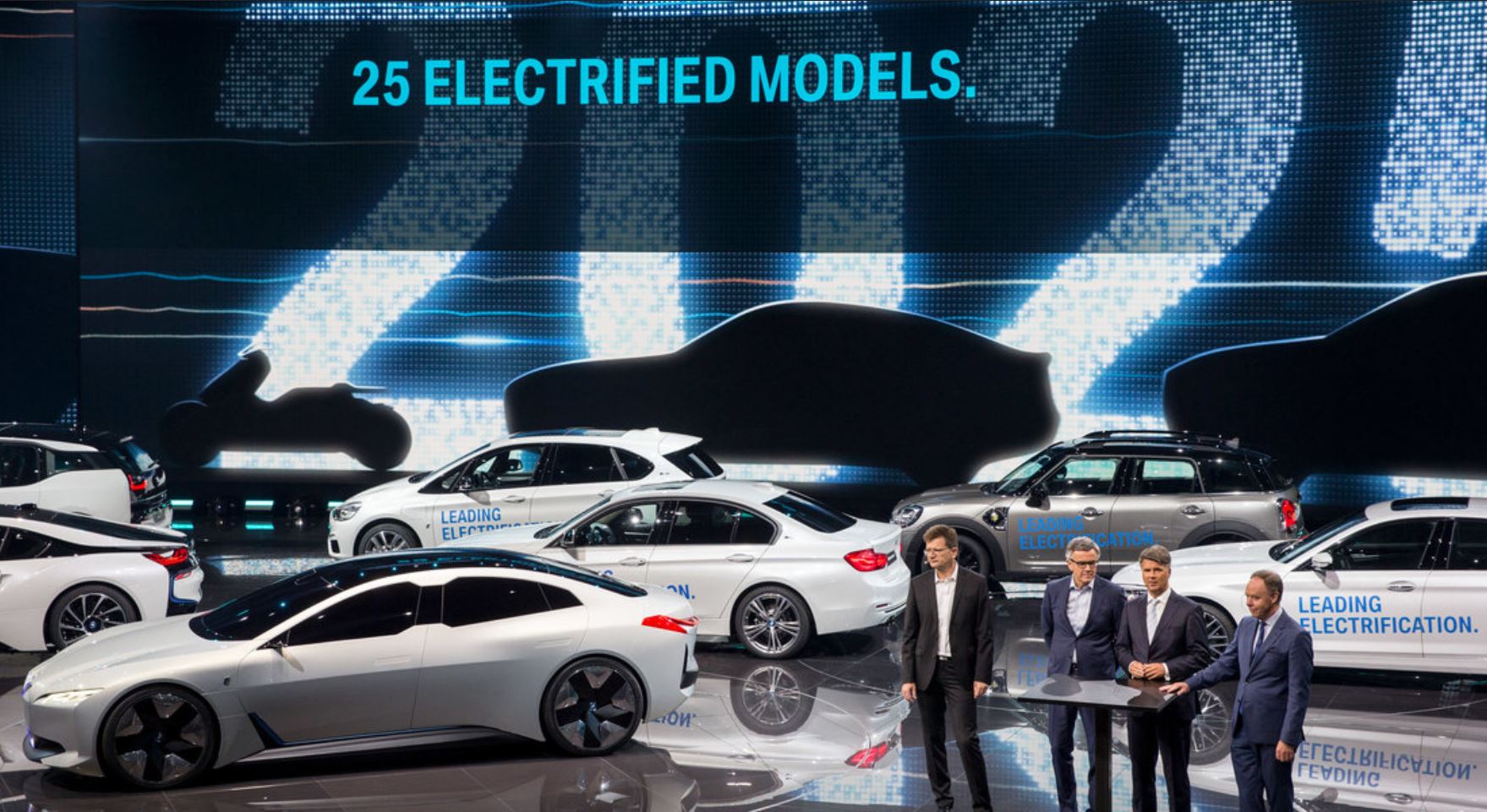Frankfurt car fair promises showdown between Fridays for Future and auto lobby
The International Motor Show (IAA) in Frankfurt from 12-22 September promises to escalate discussions about future mobility. At one of the world's largest automobile fairs, protesters are planning to challenge a car-centric mobility system that has failed to reduce emissions for decades. Their campaigns threaten to distract from the new vehicles showcased by Germany's trio of car groups BMW, Daimler (with its Mercedes Benz brand), and Volkswagen (which includes premium subsidiaries Audi and Porsche). The protests will also take aim at the government's insufficient attempts at making transport more sustainable.
Gearing up for protest
Energised by the impact of the Fridays for Future student movement, climate activists plan to descend to Frankfurt in droves, demanding a fundamental overhaul of current mobility policies and radical change at the carmakers. Supported by environmental NGOs Greenpeace, Friends of the Earth Germany (BUND), and others, protesters will call for an immediate phase-out of combustion engines, climate-neutral mobility by 2035, lower speed limits and priority for pedestrians, cyclists, and public transport during a mass bicycle ride and a protest march. They also demand "efficient electro mobility instead of big electric SUVs," a jab at the new purpose-built electric vehicles from German carmakers, the Mercedes EQC, and the Audi e-tron, both weighing 2.5 tons even when they're empty.

"Bigger and bigger cars with more horsepower and higher fuel consumption—these are the stars of the International Motor Show (IAA) in Frankfurt," the alliance argues."Crooked car companies celebrate their powerful SUVs and gas guzzlers while the German government applauds […] When the IAA opens its doors to the public on 14 September, we will be there with many thousands of people demonstrating for a swift mobility transition."
Additionally, a more radical alliance of clean mobility and climate activists called "Sand im Getriebe" ("Spanner in the works") with links to the British"Extinction Rebellion" movement plans to block IAA entrances in an act of civil disobedience, inspired by previous protest waves that proved key to Germany's landmark energy transition. "We are acting in the tradition of social movements that forced the end of nuclear and coal power and banned [genetically modified organisms]. Besides coal, now it’s traffic’s turn," the organisers say.
Globalisation critics network attac also joins the fray with a public discussion about how a "real mobility transition" could become reality, while Fridays for Future and Greenpeace activists have agreed to participate in panel discussions that are part of the IAA show.
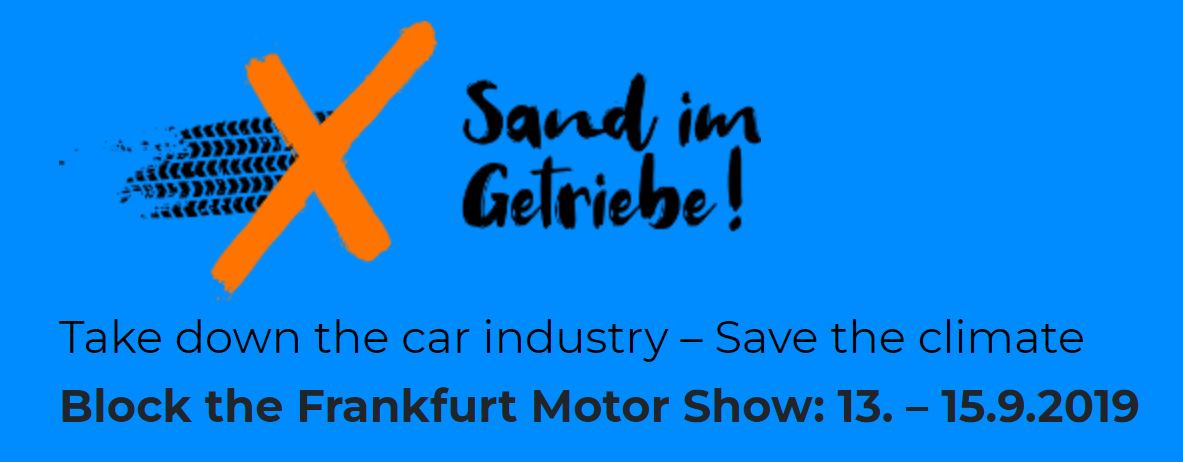
Whereas previous protests often targeted climate-damaging SUVs or local transport policies, the broad attack on the entire car industry takes the demonstrations to a "new level," according to sociologist Simon Teune, who heads the Berlin Institute for Protest and Social Movement Studies (ipb). He told the newspaper tageszeitung that the protests could have a real impact in the medium term, because they will catapult the message into the media that the car industry has blocked climate policies and missed the boat on electric mobility - foiling the show's purpose to highlight industry achievements.
Symbolic moves
BMW, Daimler and VW told the Clean Energy Wire they are ready for dialogue. "A controversial debate on the automobile and environmentally compatible mobility is important," a VW spokesperson said. "Volkswagen actively seeks to engage in a dialogue and is open to criticism." Daimler also said it would engage in dialogue with stakeholders on the basis of mutual respect, while BMW invited visitors to its exhibition space to discuss climate protection and the company's attitude.
The carmakers hope to prove their critics wrong at the IAA, by showcasing strategies and models that point to a sustainable transport future. BMW said its stand will "illustrate what our path to climate-neutral transportation looks like." Daimler also stressed that "Mercedes-Benz’s appearance at the [IAA] will be dominated by sustainable solutions for the future of mobility." However, clean transport advocates are unlikely to be silenced given that the companies' current business models rely almost exclusively on the sale of combustion engine cars.
But it's also true that fundamental change is ever more apparent within the industry. The transformation is particularly remarkable at the world's largest carmaker VW, who this year pledged to transform itself from dieselgate pariah into e-mobility pioneer, and has committed dozens of billions of euros to the task. VW plans to slowly phase out combustion engines from 2026, sell 22 million electric cars within a decade, and be entirely carbon-neutral by 2050 [For more details, see the Factsheet Huge EV bet could turn diesel pariah VW into "game-changing" pioneer].
At the IAA, VW will present the ID.3, its first fully electric model based on a new vehicle platform that forms the basis for its huge electric ambitions. The model is widely cited by media as one of the show's highlights. VW subsidiary Porsche will also unveil its first fully electric model, the Taycan. Coinciding with the IAA and symbolising the show's significance, VW will also update its company logo, including the one towering above the company's headquarters in Wolfsburg.
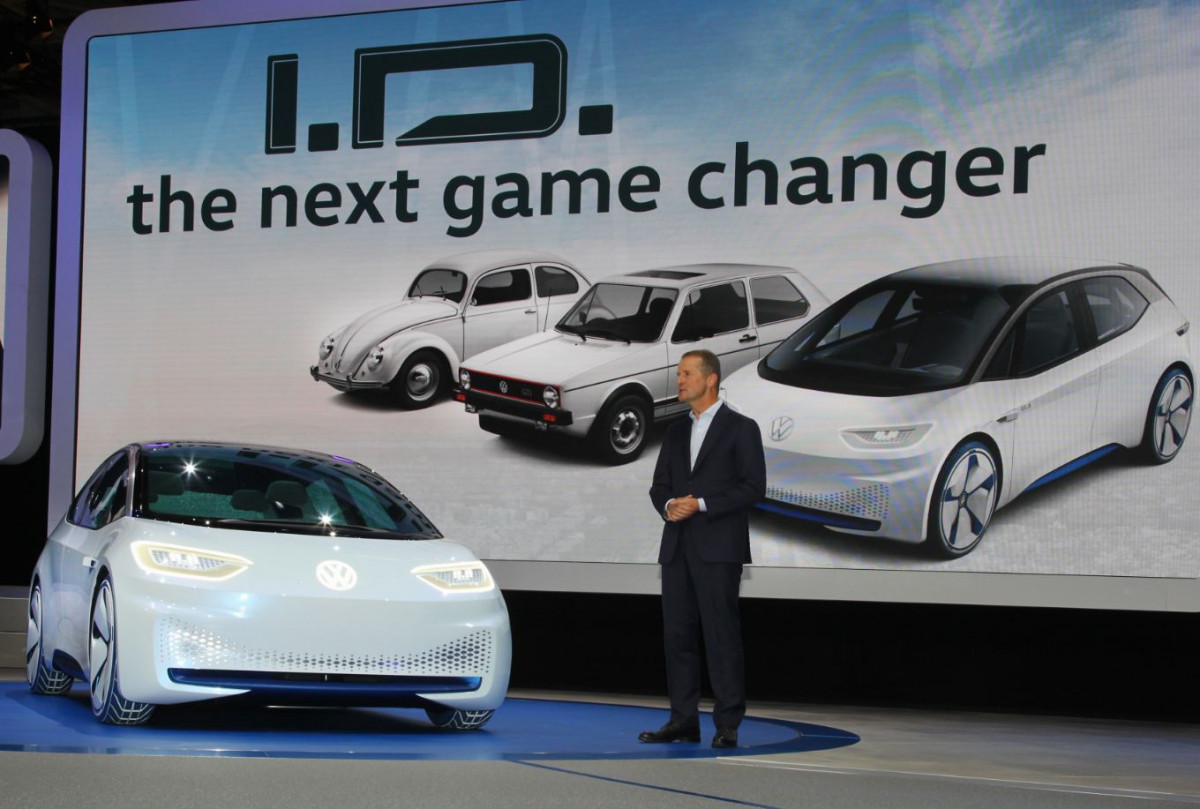
Spooked by the success of Californian newcomer Tesla, BMW and Daimler have also sharply stepped up their plans for electrification. Both companies have recently exchanged their CEOs, and industry watchers are keenly awaiting press conferences by new BMW head Oliver Zipse and his Daimler counterpart Ola Källenius.
Daimler's freshly launched all-electric model EQC is also likely to attract much interest. In contrast, arch-rival BMW has fallen back considerably in the clean mobility race, and therefore has little new to show. [For details, read the factsheets Reluctant Daimler shifts gear in race to sustainable mobility and Early e-car starter BMW has lost ground in clean mobility race]. BMW has even slashed this year's IAA budget by 75 percent to focus on other markets such as China, according to media reports.
Inconvenient truth
The IAA protests will no doubt call attention to the elephant in the room: Desperate for cash to finance the shift to green mobility, the carmakers bet on particularly climate-damaging SUVs, because these offer the highest profits. The contradiction is as obvious as it is hard to resolve, given that new clean mobility businesses are still far from being a money-spinner.
"For us, SUVs are certainly the models with the highest margins, and in view of the uncertainties surrounding the switch to electric mobility, it would be economically irresponsible to say that we are leaving this lucrative business to our competitors" argues VW. "The SUV offensive plays a crucial role in strengthening the core business and thus enabling Volkswagen to make the necessary investments in new technologies, sustainable mobility solutions and electromobility," the company told the Clean Energy Wire, adding that "the latest generation of SUVs is just as efficient in terms of fuel consumption as comparable vehicles in the respective compact or saloon classes." BMW only said it "offers vehicles in all segments with client demand," while Daimler ignored a question regarding SUV sales.
To the outrage of environmental activists, Mercedes is launching what they decry as the "monster SUV" GLS, which will top the short-term record holder BMW X7 as Germany's largest SUV. "Since the Mercedes GLS is too wide for car washes, it bends its wheels inwards. These are the absurd 'innovations' of which German carmakers are so proud," says NGO Environmental Action Germany (DUH), a vocal industry critic which set the ball rolling on diesel driving bans. These have been implemented in parts of some German cities - and may be rolled out in others - to get excessive pollution under control, constituting another headache for the industry.
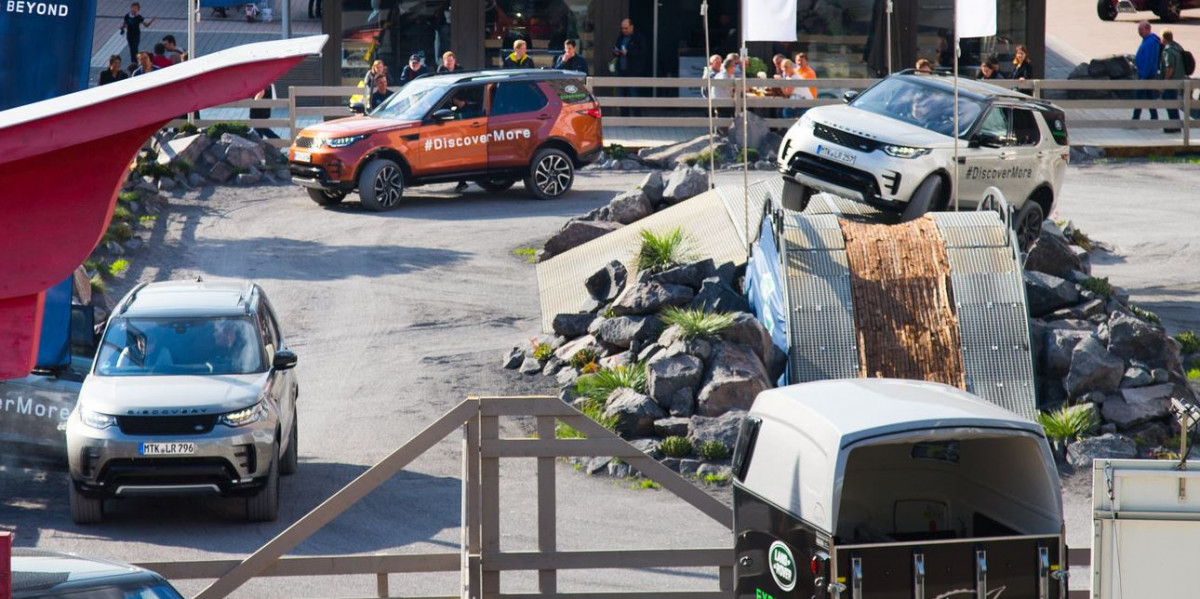
German business daily Handelsblatt recently pointed out that Daimler and BMW’s joint revenues from mobility services amount to just 3 billion euros – about 1 percent of their entire revenues. The sale of cars, car parts and components currently accounts for 99 percent of the sector’s profits. But industry watchers such IHS Markit and Boston Consulting forecast that current niche services such as ride-sharing will turn into huge businesses in the years to come, posing entirely new challenges to the carmakers, who excel at hardware developments, but face an uphill struggle in business areas primarily shaped by software and big data.
Blind date
"The carmakers hear the thunder rolling on the horizon, but the uncertainties are huge," clean mobility advocate and industry expert Axel Friedrich told the Clean Energy Wire with reference to future business models, decreasing car ownership among young people, policies aiming at reducing traffic in many European cities, and future EU emission limits. Friedrich, a prominent automaker critic who played a key role in exposing the Dieselgate scandal, says carmakers still use the IAA to measure the changes afoot in their sector. "The IAA offers a shop window for the carmakers. They are curious to see where visitors are headed. Do they flock to the e-car exhibit hall in droves, or do they still find horsepower monsters more interesting? How do they react? It's like a blind date with an uncertain outcome."
"The key question for this year's IAA is whether the carmakers' plans represent a permanent change. Have they really understood the message from Fridays for Future? Have their customers really understood?" Friedrich asked. He said he believed that VW's and Daimler's new plans represented a fundamental turnaround, but also cautioned that previous IAAs billed as 'green' turned out to be empty promises.
Volkswagen places massive EV bet to master green mobility shift
Reluctant Daimler shifts gear in race to sustainable mobility
Spotlight on a government neglecting its "problem child"
The IAA protests have not only set their sights on the car industry, but also on government policies that have failed to lower CO2 emissions in the sector. Germany's transport emissions have remained broadly stable over the last 30 years, as progress from more efficient engines has been eaten up by rising car numbers, and the rising popularity of heavy SUV vehicles.
The government is painfully aware of the shortcomings, and Chancellor Angela Merkel has repeatedly referred to the sector as the "problem child" of the country's energy transition. Partly as a result of its powerful car industry, which provides employment to more than 800,000 people, Germany is lagging behind many other countries in the shift to green mobility. Several European countries such as the UK, France, Norway and Sweden have already committed to phasing out petrol and diesel-powered cars by the end of the 2030s. Local transport policies, for example in the capital Berlin, are also a far cry from some other capital cities' efforts to push back the car, and boost clean alternatives.
Climate change has been pushed to the top of the political agenda by the Fridays for Future movement and a string of heat waves and droughts. But although a large majority of Germans say they are in favour of more climate action they still choose fuel-guzzling vehicles. Sales of highly efficient cars have declined over recent years, but fuel-intensive SUVs have recorded strong growth: SUV sales were up about 20 percent in 2018 compared to the previous year. In contrast, pure electric cars remain a rare sight on most German roads. Their number reached about 80,000 at the start of the year, compared to a total number of around 47 million cars, translating into a share of not even 0.2 percent.
In a step mirroring Germany's approach to settle on a coal exit date, Chancellor Angela Merkel's government launched a commission charged with proposing emissions cuts for the nation's transport sector. But the task force failed earlier this year to agree on enough steps to reach the country’s official aim of a 40 percent CO2 reduction by 2030. The transport commission was part of a broader government initiative to get the country on track for 2030 climate targets, which was started after it had become clear that Germany will miss its 2020 targets by a wide margin.
In a reaction to rising public pressure, Merkel subsequently set up a "climate cabinet" to ensure sufficient emission cuts during the next decade in all sectors of the economy, including transport. The IAA comes at a crunch time for German climate policy, as the climate cabinet will have its decisive meeting on 20 September, the day of the global Fridays for Future climate strike preceding the UN climate summit on 23 September.
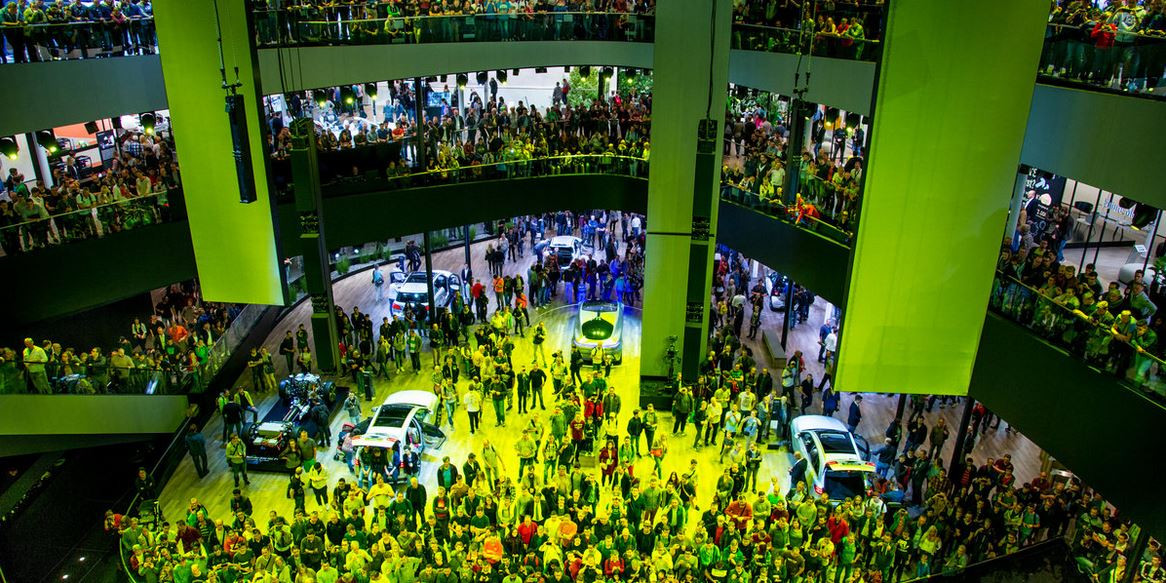
Fading into insignificance?
Given the controversies over transport policy and the fundamental shift underway in the entire car industry, some wonder whether shows like the IAA might be fading into insignificance. While BMW has drastically slimmed down its appearance, many other carmakers won't show up at all – among them global giants like Toyota and Renault-Nissan.
"The Frankfurt Car Show loses importance," says Christian Hochfeld, director of clean mobility think tank Agora Verkehrswende*. "Its previous status as an industry muscle show appears increasingly out of date, and the carmakers are developing new ways of communication. The car slowly turns into a connected device, and the companies increasingly invest in new drive trains, connectivity and onboard entertainment,” he said, adding that this makes other events like the Las Vegas Consumer Electronics Show (CES) more relevant. “But this year, the IAA is of very significant social relevance, because you sometimes get the impression that there are more visitors concerned about climate change than interested in performance cars."
*Like Agora Energiewende and the Clean Energy Wire, Agora Verkehrswende is funded by the Stiftung Mercator and the European Climate Foundation.

